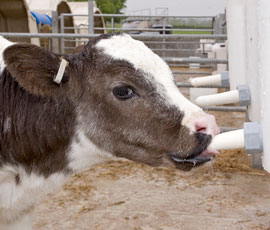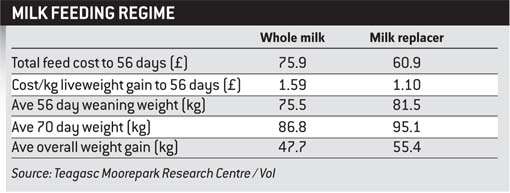Trials show benefit of whey-based calf milk replacer

Dairy calves achieve higher growth rates more cost-effectively when reared on a high-quality whey-based calf milk replacer rather than cold whole milk.
Results from trials carried out at Teagasc Moorepark Research Centre showed calves fed cold specialist whey-based calf milk replacer was more than 8kg heavier at eight-week weaning. The cost of rearing worked out at 49p/kg liveweight gain less a calf over the 10-week rearing period and the system minimised the potential spread of Johne’s disease.
A group of calves from Moorepark Research Centre’s 300-cow black and white herd were housed in batches of nine from 10 days of age and introduced to one of two feeding regimes: restricted whole milk or restricted Volac Heiferlac calf milk replacer, analysing 27% protein and 16.6% fat on a DM basis. The milks were fed once a day from a mobile teat feeder. Both groups of calves were offered a calf starter ration ad lib until they were weaned abruptly at eight weeks of age, when a commercially available calf pellet was introduced.
Calves fed milk replacer through to weaning at 56 days weighed an average 6kg heavier over those fed milk from the tank, explains Teagasc’s David Gleeson.
“Furthermore, that weight differential continued through to 70 days, when those same calves weighed an average 8.3kg more, a trend which may be attributed to the fact these calves ate 33% more concentrate over the trial period.”

Volac’s calf-rearing specialist, Maggie Gould, adds: “The trial confirmed that when feeding specialist whey-based milk replacer, manufactured from British milk in a process which preserves the natural globular proteins, the calves performed better than those reared on whole milk, which is in effect butterfat and skim with a protein level equivalent to feeding a 70% skim-based milk powder.
“Furthermore, in line with previous trials comparing milk replacer with whole milk feeding, the Moorepark calves reared on the milk replacer ate more concentrates and grew faster to weaning and beyond. Higher early concentrate intake helps promote earlier rumen development and encourages a smoother transition at weaning. This in turn reduces weaning checks and improves overall efficiency.”
